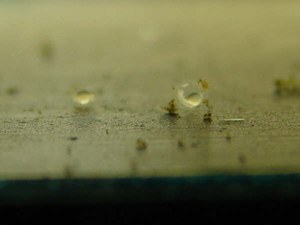Breeding Acanthocobitis zonalternans
Breeding Acanthocobitis zonalternans
![]()
On the 5th of November 2006, Mick Wright successfully spawned his Acanthocobitis zonalternans. This is an account based on Mick's logbook in which he kept the observations of the spawning period.
November 5th 2006
Mick had set the tank up with what he believed was the right setup for the Acanthocobitis zonalternans to spawn in. The tank was only small as he had no other larger ones available. Tank size was 12"x6"x6" with the base was covered with filter plates. On top of that was a mesh used as a fly screen, then a double layer of marbles. The only filtration the tank had was an air driven sponge filter. Mick placed 5 Acanthocobitis zonalternans into the tank with the gender ratio of 2 males and 3 females. One of the males was removed as they where fighting heavily with each other. So this left 1 male with 3 females. Incidentally, these Loaches were F1s from Andy Rushworth as he found them in his internal power filter when he'd had a accidental spawning of his adults.
Acanthocobitis zonalternans are very prolific, Through observation the male was seen to chase a female and sidle up close to her, then did a sort of shiver. On this, the female started to arch her back which Mick thoughts was probably her expelling some eggs. All the time iMick had seen them spawning in the stock tank, he had never been able to see any eggs or fry.
November 6th 2006
 |
The following morning, Mick could just make out a few eggs. All the Acanthocobitis zonalternans where removed from the tank with all the decor, just leaving the sponge filter. Upon looking closer, across the base of the tank there where eggs and these seemed to look fertile. The eggs had also swelled while in the water. |
November 7th 2006
 |
Some of the eggs had hatched. But the majority of the others were yet to hatch. Mick commented that there were "still to many eggs to count". In the evening time all the eggs had hatched. The hatching time was between 24-36 hours. |
November 10th 2006
 |
After closer a closer inspection of the tank. Mick witnessed that the fry had now absorbed the yolk-sac. The fry were now measuring 3mm with the first food, Paramecium being given. |
November 12th 2006
 |
Feeding update: Micro worm had been eaten by the fry. Mick also tried newly hatched brine shrimp, and this was taken by some of the fry, so Mick decided to continue feeding this way. |
 |
16th November 2006 |
November 26th 2006
 |
Feeding update: As the fry became larger, Mick tried chopped tubifex and crushed flake. Both were eagerly taken by the fry. This regime was carried on as it seemed successful at the time. Additional feedings of grindal worms were also accepted by the fry. |
November 29th - December 29th 2006
 |
 |
 |
 |
The Acanthocobitis zonalternans fry were now on all foods mentioned above with no chopping/crushing needed. On measuring the Acanthocobitis zonalternans fry, Mick found they had now attained 15mm TL in size. No fatalities were expected but 1 deformed fry was dispatched. The total number of successful fry raised was 98.
![]()
Document Actions


